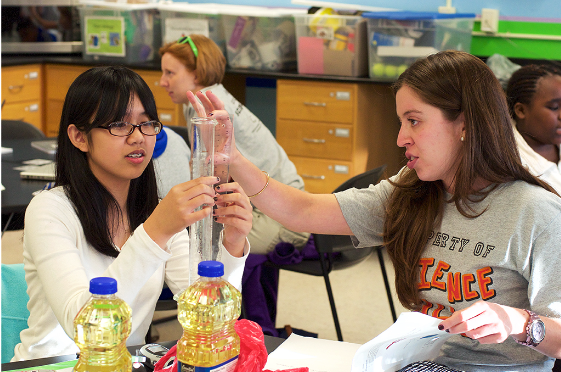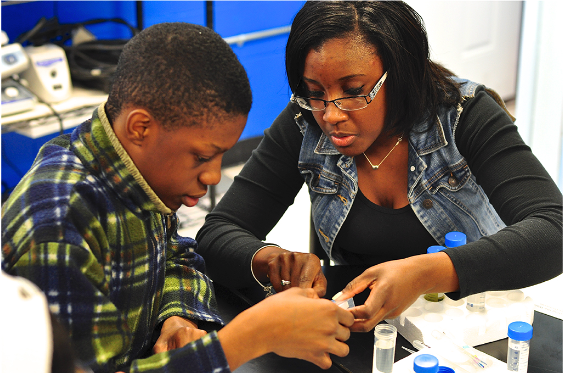
The Advancing Informal STEM Learning (AISL) Program is a National-Science Foundation initiative that funds research on a variety of STEM-based informal experiences and environments. At Rockman et al Cooperative, we’ve conducted research and evaluation of almost 30 AISL projects! Over the next month, we’re highlighting a few of those projects here.
Today, we’re spotlighting the project, “A Multi-level Investigation of STEM Mentoring – Outcomes for Middle School Youth, their Mentors, and Partner Organizations.”
Study Context: Science Club is an afterschool program for 5th through 8th graders that takes place at two Boys and Girls Clubs in the Chicago area. The program pairs two STEM graduate students or postdocs as mentors to a table of four middle school youth. The table group participates in weekly 90-minute sessions where they conduct experiments and participate in authentic science-related activities around a quarterly curricular topic.
Research Focus: Researchers from Northwestern University, University of Chicago, and REA are exploring how Science Club impacts: 1) 5th through 8th graders’ science identity and skills development, 2) mentors’ development as community-engaged science educators, and 3) other participating individuals and organizations.
Our Role: REA conducted a retrospective study with youth and mentor Science Club alumni who participated in at least one year of the program. We surveyed and interviewed these alumni to hear their reflections on their experiences, as well as whether they have pursued STEM or education-related opportunities as high schoolers, college students, or early professionals. In the coming year, we’ll be interviewing other project partners to find out how program participation has impacted them individually as well as at the organizational level.

Key Findings: Today, we’d like to share a few highlights from our mentor survey analysis.
- Science Club had a strong impact on mentors’ graduate school experience – 79% of mentors (n=142) rated its impact as a 7 or higher on a 10-point scale.
- Specifically, mentors thought that Science Club had:
- Helped them become better science communicators and science educators.
- Provided an outlet outside of lab research that reminded them why they loved science in the first place
- Solidified a desire to participate in future science outreach
“As a graduate student, your love for science can get a bit lost in the day-to-day drudgery of (often failed) experiments. Participating in Science Club was a weekly reminder of why I fell in love with science in the first place – the curiosity and the wonder of how things work and the ability to test your hypothesis and arrive at conclusions. I could then take that renewed sense of wonder and apply it back to my scientific research, perhaps helping me to see my research in a new light, and/or keeping me motivated during rough periods of consistently failed experiments.”
For More Information: You can find out more about Northwestern University’s Science Club program here. Findings from previous evaluative studies of Science Club’s impacts can be found here.
*Photos retrieved from Science Club article in Connected Science Learning (Volume 1, Issue 1)